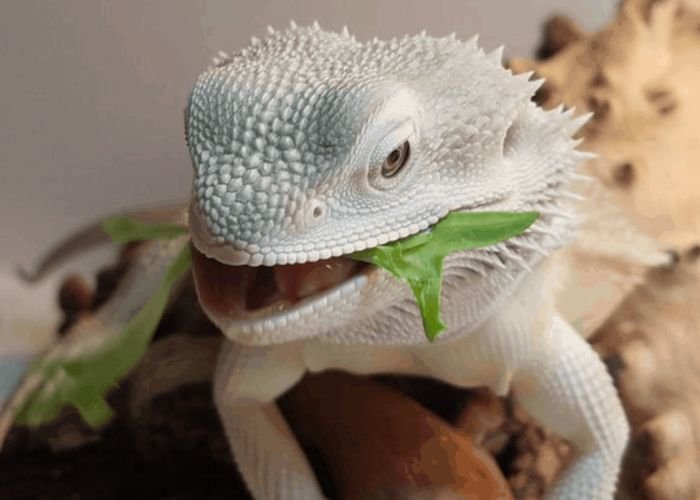Bearded dragons, scientifically known as Pogona vitticeps, are a popular pet choice due to their amiability and endearing appearance. In their never-ending quest to find exotic ingredients for their pets’ meals, many individuals take the time to research what is safe to feed amphibians and reptiles. The subject of whether bearded dragons can eat spiders arises frequently when people consider bearded dragon care. What do bearded dragons consume? Can they eat spiders? What else do they need to keep healthy? We’ll find out in this comprehensive guide. Let’s read below”Can Bearded Dragons Eat Spiders Reptilein”.
Exploring Bearded Dragon Nutrition:Can Bearded Dragons Eat Spiders Reptilein
Understanding Bearded Dragons’ Dietary Needs
To properly feed a bearded dragon, one must first be familiar with its typical eating habits. Bearded dragons are omnivores, meaning they consume both plant and animal foods. They subsist on a diet of insects, small animals, fruits, flowers, and greens when they inhabit natural environments.
The dietary composition for a captive bearded dragon usually consists of:
Insects: The traditional diet of a bearded dragon consists of insects like crickets, dubia roaches, mealworms, and silkworms. Consuming insects is an excellent method to supply your body with essential minerals and protein.
Vegetables and Fruits: Dark-leafed greens (e.g., kale, collards, and mustard greens) and berries (e.g., blueberries, papayas, and berries) supply the vitamins, minerals, and fibre they need to stay healthy.
Supplements: Many people take vitamin D3 and calcium supplements to make sure they receive enough of these nutrients; these assist the body absorb calcium and keep bones healthy.
The Spider Conundrum: Can Bearded Dragons Safely Eat Spiders?
Spiders are abundant in many areas and bearded dragons may encounter them in their natural habitat. Be cautious, though, because captive bearded dragons need special attention when eating spiders.
Potential Risks of Feeding Spiders to Bearded Dragons
Toxicity: although not harmful to humans, could be fatal to bearded dragons and other tiny reptiles. Even non-venomous spiders provide a risk of infection due to the parasites and germs they carry.
Digestive Issues: Due of their indigestible thick exoskeleton, bearded dragons may suffer gastrointestinal problems like impaction if they eat spiders.
Nutritional Imbalance: Bearded dragons can’t obtain the complete and balanced nutrition they require from spiders, leading to an imbalanced diet. They are a little high in protein, but otherwise deficient in all the nutrients a reptile requires for optimal health.
Recommended Alternatives for Varied Nutrition
To make sure your bearded dragon gets a balanced and healthy diet, it’s best to provide it a variety of foods that cover all their nutritional needs:
Insects: insects like mealworms, roaches, and crickets are great choices for feeding insects. Bearded dragons can benefit greatly from eating these little insects since they are easier to digest than spiders.
Leafy Greens: leafy greens should make up a significant portion of their vegetable intake. Some excellent choices that are abundant in minerals and vitamins are mustard greens, collards, and dandelion greens.
Fruits: give your pet some every so often. It is recommended to consume these in moderation due to their high sugar content.
Commercial Diets: You shouldn’t substitute a balanced diet of naturally occurring foods for beardded dragon pellets or reptile-specific commercial meals, though they can be useful as a supplement.
Meeting Nutritional Requirements for Bearded Dragons
It is critical to feed bearded dragons the correct stuff if you want them to stay healthy and happy. For the purpose of ensuring that children consume a balanced diet:
Gut Loading: Provide a balanced diet of insects to your bearded dragon to avoid gastrointestinal loading. One way to make insects more nutritious is to use a process called gut loading.
Dust with Supplements: Lightly dust insects with a dose of calcium and vitamin D3 before feeding them to your pet. Doing so can help prevent deficiencies and keep bones in good health.
Offer Variety: Routinely Changing Their Food Will Guarantee They Get Various Supplements. Make a point to give a reasonable blend of food sources as opposed to exorbitant measures of only one.
Conclusion
Regardless of their flexibility and versatility, hairy winged serpents are powerless to various food varieties that can be hindering their well-being. Try not to give hairy mythical serpents bugs when found out if they can eat them on account of the risk of harmfulness, gastrointestinal issues, and wholesome lopsidedness.
A fluctuated diet including bugs, salad greens, and at times organic products, along with any enhancements these fascinating reptiles might require, is critical to keep them sound and dynamic. To guarantee a long and solid life for your whiskery winged serpent in imprisonment, teaching yourself on its exceptional dietary requirements is important. I hope you like reading”Can Bearded Dragons Eat Spiders Reptilein”.

